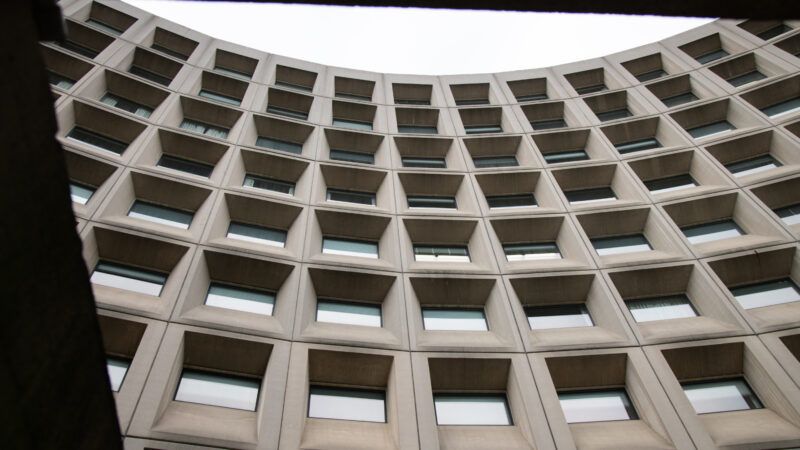Trump Outlaws Ugly Federal Buildings
Plus: House OKs bloated $1.4 trillion spending package, new Amash bills aim to protect asylum seekers and immigrant detainees, and more...

Brutalist buildings begone! The White House just gave us a latecomer entry for the most perfect illustration of President Donald Trump's commitment to central planning and petty shows of executive power. Yesterday, the president issued an executive order micromanaging the aesthetics of federal buildings.
All public federal buildings "should uplift and beautify public spaces, inspire the human spirit, ennoble the United States, and command respect from the general public," as well as "respect regional architectural heritage," says Trump's latest executive order, issued Monday.
"In the District of Columbia, classical architecture shall be the preferred and default architecture for Federal public buildings absent exceptional factors necessitating another kind of architecture," it continues.
The order reportedly represents a compromise for Trump, who wanted to ban modernist design in federal building plans.
"The administration has been writing the executive order for months, and an early draft that would have banned modernist design prompted condemnation from the American Institute of Architects and the National Trust for Historic Preservation," notes Bloomberg News.
To be clear, downtown D.C. is full of some fairly hideous Brutalist buildings that start to resemble a dystopian nightmare when you bunch them too close together. But that seems fairly fitting for federal government offices, no? In any event, building design is not something the U.S. president should bother officially opining about, let alone making dictates on.
Trump's new "Executive Order on Promoting Beautiful Federal Civic Architecture" goes on for 13 paragraphs of gripes about the history of federal design decisions before even getting to its policy section. Then, like so many of Trump's executive orders, the "policy" he lays out is mostly vague, pompous, and unenforceable fluff (thankfully).
For example, the order states that new non-classical style federal public buildings are OK so long as they still convey "the dignity, enterprise, vigor, and stability of America's system of self-government." When renovating or redesigning existing buildings, "where feasible and economical," doing things with an eye toward classical style "should be given substantial consideration, especially with regard to the building's exterior."
FREE MARKETS
Congress OKs $2.3 trillion appropriations and stimulus package. In case you hate yourself, here's the whole 5,593-page omnibus spending bill (including a $900 billion coronavirus relief package) that passed the House of Representatives and the Senate yesterday. The bill is brimming with things that go far beyond funding existing government programs and expanding pandemic-related stimulus measures, including a section that bans the U.S. Postal Service from mailing vaping products and a bit that makes streaming unlicensed videos a felony that could get you up to 10 years in jail.
The spending bill passed the House first, in a 359–53 vote. The only two Democrats to vote against the bill were Reps. Rashida Tlaib (Mich.) and Tulsi Gabbard (Hawaii). Rep. Justin Amash (L–Mich.) and 50 Republican representatives also voted no.
Later Monday, the Senate approved the omnibus appropriations bill in a 92–6 vote. The six votes against it all came from Republicans, including Sens. Ted Cruz (Texas), Marsha Blackburn (Tenn.), Rand Paul (Ky.), and Mike Lee (Utah).
FREE MINDS
A new bill from Rep. Amash aims to protect the rights of asylum seekers. "The Protect Asylum Seekers Act makes U.S. policy toward asylum seekers more coherent and humane by providing that individuals who request asylum upon arrival in the United States will not have committed a crime if they crossed the border between ports of entry," states a press release from Amash's office. "This change will prevent unnecessary prosecutions and ensure parents aren't separated from their children to accommodate such prosecutions. The bill also prohibits immigration authorities from separating families unless a child is in danger."
He also introduced a second piece of legislation, the Practical Alternatives to Detention Act, which would require the Department of Homeland Security to use alternatives to detention when people are eligible for it. Alternatives to detention (ATD) programs "replace detention with case management services and electronic monitoring" and "have been proven to help immigrants comply with the immigration process through cheaper and more humane measures than detention." More:
Access to ATD programs is especially important for families with children, pregnant women, people with medical needs, and those with elevated health risks related to public health emergencies such as pandemics. Accordingly, the Practical Alternatives to Detention Act prioritizes those populations, in addition to asylum seekers, for ATD programs.
A couple of cases I wrote about yesterday provide good examples of why the current system of keeping people on civic immigration holds in jails has got to end.
QUICK HITS
The death numbers just keep climbing. We are now averaging 2,679 deaths per day in the U.S. — another record.
Over just the past month, we've recorded about 64,000 new deaths. The average annual flu season in recent years had about 36,000 deaths.https://t.co/74QzWYbn1p pic.twitter.com/fTfUDsUOVb
— Mike Baker (@ByMikeBaker) December 22, 2020
- Since Austin cut some police funding, the governor of Texas is trying to hand control of city cops to state police.
- Read Reason's Damon Root on a 14th Amendment case that deserves the Supreme Court's attention.
- The New York Police Department's response to summer protests escalated tensions and violence, says city investigators.
-
"Law enforcement agencies in Florida seized nearly $266 million in cash, cars, homes and other property in 2018, outpacing every other state in forfeiture collections," reports the Orlando Sentinel on a new report from the Institute for Justice.


Show Comments (487)